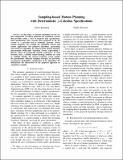Sampling-based motion planning with deterministic u-calculus specifications
Author(s)
Karaman, Sertac; Frazzoli, Emilio
DownloadFrazzoli_SamplingBased.pdf (1.411Mb)
OPEN_ACCESS_POLICY
Open Access Policy
Creative Commons Attribution-Noncommercial-Share Alike
Terms of use
Metadata
Show full item recordAbstract
In this paper, we propose algorithms for the online
computation of control programs for dynamical systems
that provably satisfy a class of temporal logic specifications.
Such specifications have recently been proposed in the literature
as a powerful tool to synthesize provably correct
control programs, for example for embedded systems and
robotic applications. The proposed algorithms, generalizing
state-of-the-art algorithms for point-to-point motion planning,
incrementally build finite transition systems representing a
discrete subset of dynamically feasible trajectories. At each
iteration, local -calculus model-checking methods are used
to establish whether the current transition system satisfies
the specifications. Efficient sampling strategies are presented,
ensuring the probabilistic completeness of the algorithms. We
demonstrate the effectiveness of the proposed approach on
simulation examples.
Date issued
2010-01Department
Massachusetts Institute of Technology. Department of Aeronautics and Astronautics; Massachusetts Institute of Technology. Department of Electrical Engineering and Computer Science; Massachusetts Institute of Technology. Laboratory for Information and Decision SystemsJournal
Proceedings of the 48th IEEE Conference on CDC/CCC 2009
Publisher
Institute of Electrical and Electronics Engineers
Citation
S. Karaman and E. Frazzoli. Sampling-based motion planning with deterministic µ-calculus specifications. In Proc. of IEEE Conference on Decision and Control, Dec. 2009.
Version: Author's final manuscript
ISBN
978-1-4244-3871-6
ISSN
0191-2216
Keywords
temporal logic specification, sampling based motion planning, provably correct control program, probabilistic completeness, point-to-point motion planning, finite transition system, iteration method, dynamically feasible trajectory, dynamical system, control program online computation